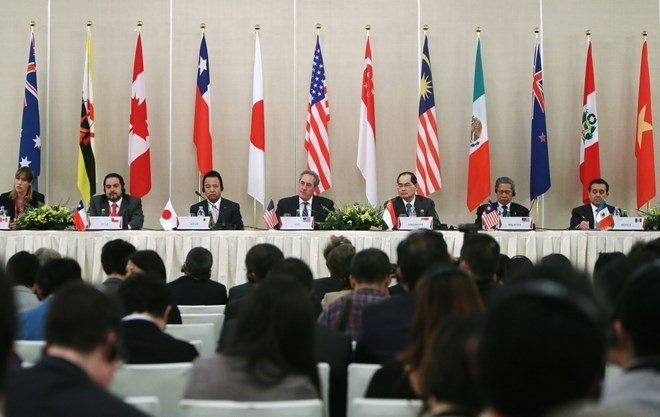(VOVworld) - Economic ministers from 12 member nations signed the Trans-Pacific Partnership (TPP) agreement in Auckland, New Zealand on Thursday. At the signing ceremony, New Zealand Prime Minister John Key said his country was proud to be the host and an active member throughout the negotiation process. He said the TPP will help liberalize trade across the region and bring benefits to all members.
 |
| Representatives from 12 TPP member nations. (Photo: EPA) |
Member states now have two years to complete domestic work for TPP ratification. The pact will take effect when ratified by parliaments of least six signatory countries, who comprise a minimum of 85 percent of all members’ overall GDP. This means that the two biggest economies – the US and Japan – must be among these six members.
The TPP started out as P-4 with Chile, New Zealand, Singapore and Mexico. The US joined in September 2008 and Vietnam in early 2009. The deal now brings together 12 countries: Australia, Brunei, Canada, Chile, Japan, Malaysia, Mexico, New Zealand, Peru, Singapore, the US and Vietnam. The pact aims to break down trade and investment barriers between these countries of 800 million people , which constitute 30 percent of global trade and about 40 percent of the world’s economy.
Speaking to VOV after the signing ceremony, Minister of Industry and Trade Vu Huy Hoang said the agreement was signed on schedule as committed: “For Vietnam, the signing of the TPP is a significant milestone for its integration of global economy as this is the first time Vietnam negotiates and signs a high standard trade negotiation like TPP. This shows Vietnam’s progress in global economic integration since its ASEAN membership in 1995. TPP agreement is expected to bring about great economic opportunities for Vietnam”.
Vietnam is expected to gain significant benefit from the TPP as the pact is projected to help expand the country’s GDP by 23.5 billion USD by 2020 and 33.5 billion USD by 2025.